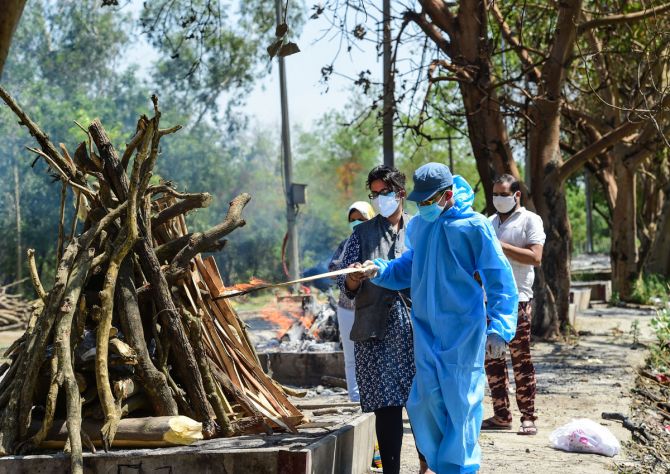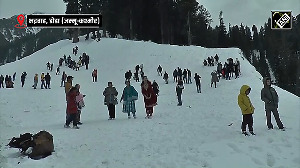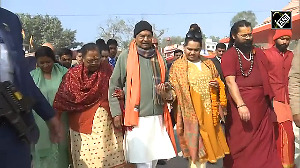'We can't rule out the fact that the virus might have changed in such a way that it's actually causing more harm to young people.'

Most evenings or mornings, Dr Priya Sampathkumar, who lives on Rochester, Minnesota, fieldS almost two dozen calls from India.
Relatives, friends, relatives of relatives, relatives of friends or friends of relatives back home are calling her for COVID-19 advice.
An infectious disease and critical care specialist, Dr Sampathkumar is the chair of the infectious prevention and control department at the world famous Mayo Clinic.
She has been treating the COVID-19 ill since early last year in the US and simultaneously keeps an eye on the situation in India, dispensing advice and offering help via India COVID-19 SOS Mission and on social media, along with her husband Dr Vincent Rajkumar, a senior hematologist at Mayo Clinic.
In the second part of an enlightening interview with Vaihayasi Pande Daniel/Rediff.com Dr Sampathkumar discusses how data is important to control the pandamic.
- PART I: 'Mucor is very scary'

The government has been accused of fudging case rates and the number of deaths, particularly in some states, like Uttar Pradesh, where the appearance of 50-60 bodies in the Ganga, downstream in Bihar, indicates that the reality about deaths might be quite different.
There are obvious dangers to concealing numbers -- there can be no planning for care, hospital beds, oxygen or body disposal. As a doctor what are the other dangers you see?
Clear, transparent data is essential for all of us to learn about the pandemic.
This is not the end of it. I think we're going to have more hotspots in other parts of the world and we need data to know what to do.
Right now, we're being asked: Is this virus more infectious? Has the virus changed its behaviour?
I think it has. We can definitely say it's more infectious just based on what we know. In previous months, (with regards to) the infectivity rate was you had maybe 30 per cent of family members getting infected. Right now, it appears, it's almost 100 per cent. So definitely, it's much more infectious.
Whether or not the virus is more lethal ie is it causing more severe disease? Or is it causing higher mortality, just by virtue of viral behavior? We really don't know. Because I don't trust any of the data that's coming out (of India). I think deaths are vastly underreported.
We have no idea how many cases there are. Because we don't have enough testing. And people are fudging the numbers.
When we don't know, the total number of cases, when we don't know the total number of deaths, we can't actually make any judgments on: Is the virus more lethal? Is the virus' behavior different? Should we be approaching it differently?
We're just operating in this void, which is totally counterproductive. Without data, we can't advance the science and without advancing the science, we can't control the pandemic.

From the doctors and scientists, one has spoken to, it seems that it is not entirely apparent what has caused the second wave. You are also indicating that information about the variant is not totally conclusive.
The second wave may have also not been caused by the variant alone. It might have been caused by a lot of irresponsible behavior, right from the leadership downwards.
Secondly, what is puzzling is, a lot of doctors are telling me that they're seeing much younger people. I know of younger people who have died. So how does that tie in?
So that's the exact thing.
We don't know whether this virus is behaving differently. And that's why we need data.
There are some theories about why more young people are dying in the second wave. One is that a lot of older people have been vaccinated.
Rightly so, the vaccination campaign focused on older people. Although only about 3 per cent of Indians are vaccinated, roughly 35 per cent of the elderly have been vaccinated. They're somewhat protected.
Secondly, they are able to stay home. They have not been out as much. And they're still a little bit of fear (for them) about COVID-19.
Young people have had the impression that COVID-19 is done with, and you don't need to worry, and they've been gathering in much, much larger numbers than older people. So, because they're out and about, they're getting exposed to very large viral loads. And that, I think, is also overwhelming their immune system. So, it's a combination of things.
But we can't rule out the fact that the virus might have changed in such a way that it's actually causing more harm to young people. We just don't have that information, because we don't have the data right now.

But it could also be about mismanagement of the administration of steroids? Many people seem to be getting better and then suddenly dying.
Again, anecdotally, I think that is very true.
Personally, I've been getting every day 10 to 20 phone calls from people in India, asking about care of their loved ones.
Steroids, like I said, are lifesaving.
But they need to be used appropriately and at the right time. Overusing steroids, using them too early or continuing to give them, when they're no longer needed, suppresses the immune system.
And can kill a young person too?
Not just that. They suppress the immune system make the young person more vulnerable to infection.
When you're in the hospital, at the best of times, hospitals are breeding grounds for all kinds of bacteria. In the current situation, where the system is completely overwhelmed, infection control practices have completely broken down. So, a simple IV site or, a simple catheter site can become a source of infection. And bacteria in India is highly drug resistant.
These young people are also getting all these cocktails of other antibiotics, which again predisposes them to infection.
It's all just this vicious cycle.
So being in a hospital, being on steroids, getting IV medications now predisposes you to other types of infections. You get it, and you go into sepsis and die.
Other than sepsis?
The other thing that can happen is that, when you're in the hospital, and you're immobile, you can get blood clots. We learned that early on here. We anticoagulated patients to reduce the risk of blood clots. These blood clots typically are in the legs, and they break off, go to your lungs and can kill you.
DVT?
Exactly DVT (deep vein thrombosis). And PE (pulmonary embolism).
We really need to know how many people are dying, what the cause of death is, to understand what to do and covering up deaths, covering up the cause of the death (is not the way). I personally know, of people whose who've died of COVID-19. And their death certificate reads cardio-respiratory failure, which essentially means your heart stopped working. Yes, it did. But why?
- PART III: Sputnik vaccine shows 92% efficacy
Feature Presentation: Ashish Narsale/ Rediff.com











 © 2025
© 2025